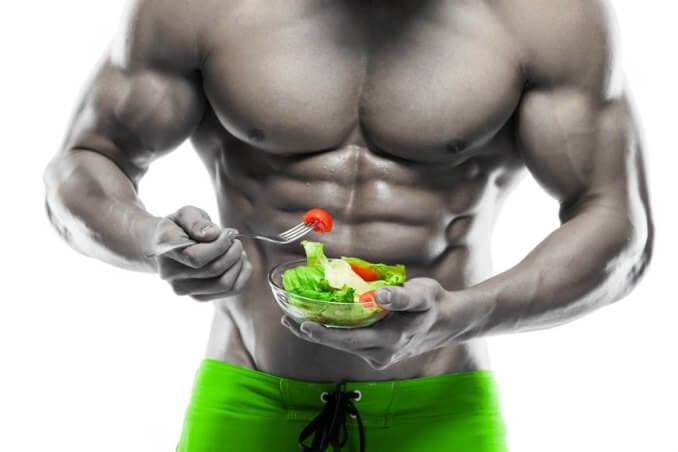
So you have decided to go vegan… completely plant-based. However, you also want to gain muscle. Is it even possible to gain muscle with plant nutrition? Yes it is! Here’s how.
First, The Basics On Building Muscle
In order to gain muscle – it is important to do resistance exercises, and eat the right amount and type of protein. To not only maintain but actually build muscle may take more protein than you think, but more on that in a moment.
What Are The ‘Right Types’ Of Protein?
‘High quality protein’ provides enough of all the essential amino acids needed to gain muscle, and it’s easily digested too.
Most animal proteins contain all the essential amino acids, and are well absorbed/digested. Plant based proteins on the other hand, tend to lack one or more essential amino acids. They also tend to be harder to digest. In general, they tend to have a 70 to 90 percent digestibility. However, digestibility for soy and legumes is over 90 percent.
Is There A Way I Can Improve The Protein Quality Of Plant Proteins?
Yes, there is. Foods such as rice and beans are missing essential amino acids. When combined together, they make a complete protein. As a result, you need to eat a variety of plant based proteins to make sure you are consuming all the essential amino acids.
Also, since plant proteins are less digestible than animal based proteins, you may need to eat more protein to compensate for the poor digestibility.
You talk about combining foods. Do I have to combine them at each meal?
No. As long as you are eating a variety of plant based proteins throughout the day, it is not necessary.
How Much Protein Do I Need?
You need anywhere from 1.2 to 2.0g/kg bodyweight (BW) every day to gain muscle. Since plant based proteins are less digestible, it is suggested that you aim for protein intakes around 2.0g/kg BW/day. If you are trying to lose weight, you may want to aim for up to 2.7g/kg BW/day. This will help prevent muscle loss while you are dieting.
How On Earth Will I Meet My Protein Needs?
You can do this by eating low fat, high protein vegan choices. These include:
Quinoa
One cup of cooked quinoa provides 8 grams of protein and only 3.6 grams of fat, making it a good low fat source of protein. It is also a complete protein.
Tip: Instead of corn flakes, have a bowl of quinoa flakes, or quinoa porridge.
Soy beans
Two cups of boiled soy beans provide 44 grams of protein and is a complete protein source.
Tip: Incorporate soy beans into your salads!
Kidney beans
Two cups of kidney beans provide 30 grams of protein and only 2 grams of fat!
Tip: Make a chili using mixed beans.
Tofu
Two cups of tofu provide 40 grams of protein and is a complete source of protein.
Tip: Marinate tofu in your favourite sauce.
Lentils
Two cups of cooked lentils provide 36 grams of protein and only 2 grams of fat!
Tip: Make a lentil salad. Pair it with whole wheat flatbread for a pre-workout snack.
Peas
Two cups of boiled split peas provide 32 grams of protein and only 2 grams of fat.
Tip: Make some split pea soup for lunch!
When Should I Eat Protein?
You should space your protein intake every 3 to 5 hours over multiple meals. You should also consume protein right after (0 to 2 hours after) your workout. Of importance, the protein consumed after your workout should be high quality protein such as quinoa or soy. Ideally, you want to eat this within an hour post workout for optimal muscle gain.
Studies show that when you eat protein after your workout, it stimulates the making of proteins for up to three hours. This leads to more muscle gain. If you skip the protein, it will hurt the muscle gain.
You also want to make sure you eat before exercising! Exercising on an empty stomach results in more protein losses. Also eating before you exercise will provide the energy you need to make it through your workout. A great food to consume is quinoa as it is a complete protein and is a good source of carbohydrates to fuel your workout.
In particular, you should focus on having some protein before your workout. Studies show that if you eat protein before your workout, you will increase muscle mass, muscle strength, reduce fat mass, and improve your post workout recovery.
Also keep an eye on foods that can reduce muscle soreness as including some of these foods in your diet can greatly reduce those aches and pains the day after your workout.
I’ve Heard About Branched Chain Amino Acids (BCAA’s)? Where Do They Fit In?
Consuming branched chain amino acids (BCAA’s), in particular leucine, stimulates the muscle protein synthesis resulting in more muscle gain. It also helps you recover from exercise. Milk-based proteins tend to be the gold standard (unfortunately whey protein does beat nuts). However, soy and lentils also provide leucine.
What About Supplements To Build Muscle?
If you are unable to meet your protein needs with food sources alone, or if you find them inconvenient, by all means use supplements. Many independently tested vegan protein supplements are available to help you meet your protein needs.
References:
http://www.onegreenplanet.org/vegan-food/5-plant-based-foods-that-will-help-you-build-muscle/
https://www.acsm.org/docs/default-source/brochures/protein-intake-for-optimal-muscle-maintenance.pdf
https://www.ncbi.nlm.nih.gov/pubmed/22150425
https://www.dietitians.ca/Downloads/Public/noap-position-paper.aspx
https://www.ncbi.nlm.nih.gov/pmc/articles/PMC5598028/
http://nutritiondata.self.com/